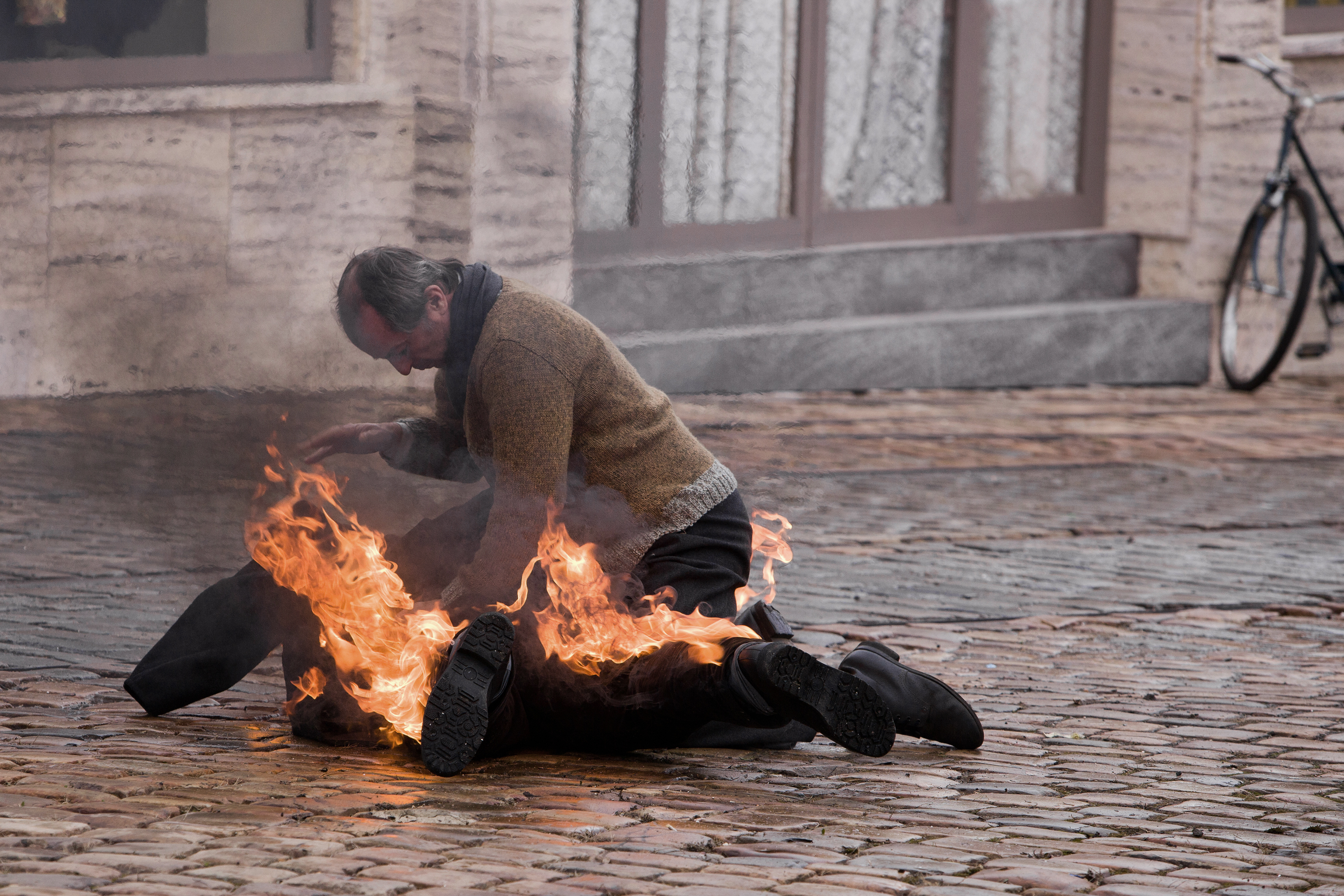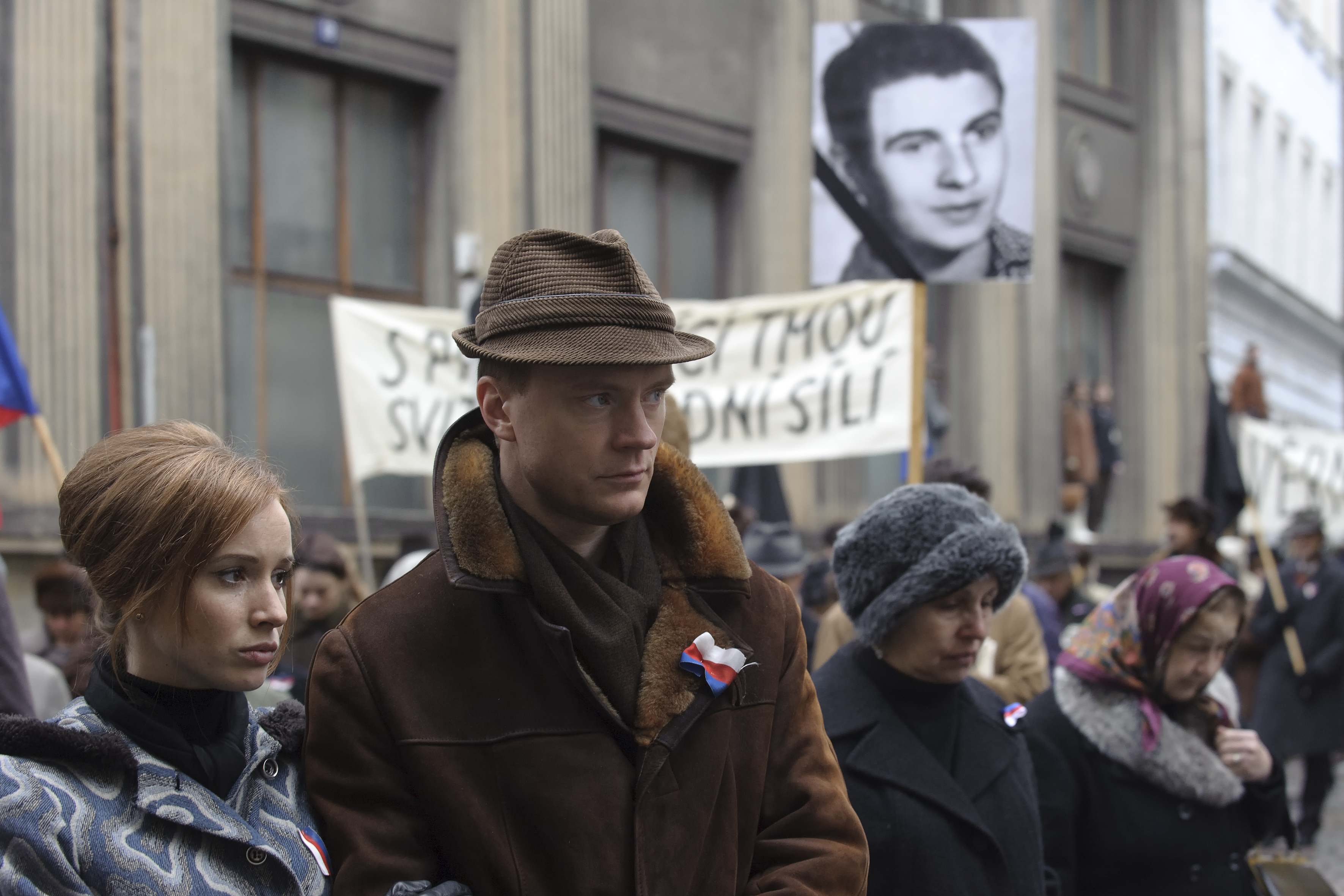The television miniseries directed by Agnieszka Holland on the tragedy of January 1969, is arguably the best Czech film of the year. Since it was originally made for television, it has been excluded from the Oscar race

(Photo: HBO, Dušan Martinček)
“I wanted to tell the story behind the story. All the Czechs know who Jan Palach was, but they only know the symbol”. Here, according to screenwriter Štěpán Hulík, lies the motivation behind Hořící keř, one of the most important and ambitious Czech film productions in recent years.
Directed by a figure of great depth and dedicated to the true story that deeply influenced the social awareness of Europe in the 60s, the film originated as a miniseries for television which told the events that followed the sacrifice of the young student of the Faculty of Philosophy in Prague, who sacrificed himself in protest against the Russian occupation.
The work of Polish director Agnieszka Holland, described as the biggest production in the history of the HBO Europe network, has virtually dominated the attention of the film press in the Czech Republic in 2013. Initially, it was as a result of the critical acclaim at the festivals of Karlovy Vary and Toronto, then, in recent weeks, due to the controversial nature in which it was snubbed, as the film to represent the Czech Republic at the Oscars in the category of best foreign film, in favour of the new film by Jiří Menzel, Donšajni.
Does it really deserve all the praise however? We have explored the major Czech cinematic and televisual event of the year, and how it was born.
It was indeed Hulík, the twenty-nine year old screenwriter and film historian, who devised the project, having first heard of Palach as a child in 1990 when the remains of the student were returned to Prague. Amazed that no one had ever dedicated a film or miniseries to the Czechoslovak patriot, Hulík decided it was time to pay homage to the man who sacrificed himself to “wake up” his people by setting himself on fire in January 1969 in Wenceslas Square. Since many aspects of the young university student’s life still remain a mystery, the first obstacle to overcome was to decide how to approach the project. The hurdle was overcome by focusing on the aftermath of his death, when the effects of the invasion and Palach’s sacrifice were clearly visible, while deciding to show how the regime had tried to diminish the importance of the gesture, describing it as an error or as a reckless act from an insane mind. However, Palach himself, is not in the spotlight, but instead the story of the young lawyer Dagmar Burešová, who was contacted by Jan’s mother to defend the honor of the deceased son, and eventually became the first Minister of Justice after the Velvet Revolution.
In addition to the gifted, beautiful Slovak actress Tatiana Pauhofová, who plays the heroine Burešová, the production also boasts the involvement of Jaroslava Pokorná who masterfully plays the mother of Palach, not to mention names of the calibre of Jan Budař, Ivan Trojan and Martin Huba in the role of Vilém Nový, the politician accused of slander by Burešová. The famous speech from Nový regarding Palach in which he tries to tarnish his memory, forms an important part of the plot.

(Photo: HBO, Dušan Martinček)
Despite an excellent cast, the key member of the crew and the entire production, the real ace in the hole was the choice behind the camera. In addition to being an internationally respected director, Agnieszka Holland experienced many of the events told in the plot first hand, having been a student of Famu (the Prague film academy) during the Prague Spring, even spending six weeks in prison for her support of government reforms and distributing illicit materials. Curiously, despite being Polish, Holland has always claimed to have been more influenced by the Czech cinema, in particular by Miloš Forman, Ivan Passer, and Věra Chytilová. Furthermore, having a Slovak husband, she maintains a close bond with the former Czechoslovakia. Her most famous film work remains “Europa Europa” (1991), a film set in Nazi Germany, which won the Golden Globe for best foreign film. In addition to her personal history in the Czech Republic, and her long filmography her work on “The Wire”, frequently voted the best American television series of all time, played a decisive role in convincing the producers of Hořící keř that she was the right person to command the project and capture the atmosphere of Czechoslovakia in the period. “It was a very sad country, there was not even the hope that changes could occur”, says the director regarding the years, which were painstakingly reconstructed by the filmmaker, also thanks to the wonderful photography.
From the early screenings in Prague already in January, to those in various high level festivals, such as Karlovy Vary, Toronto and Rome Fiction Fest, the work has been an overwhelming success, even garnering a prize for Ivan Trojan at the Monte Carlo Television Festival, where he won the best actor award. Despite being essentially a television production, it was evident that no other Czech film would rival the work of Holland, and therefore it is unsurprising that Hořící keř was initially chosen by the National Film Academy to represent the Czech Republic at the Oscars. It seemed almost a certainty until the first week of October when the American Academy disqualified the film on the grounds that it had been broadcast on the European channels of HBO before arriving at the cinema. The disappointment among critics of the country soon became barely concealed anger, as to replace it, the Czech academy chose Donšajni, the new film by Jiří Menzel, despite mainly negative reviews. “Disgrace” and “ridiculous” were among the most frequently used words in the newspapers regarding the decision. It has even been claimed that a significant number of members of the academy has not even seen Menzel’s film, which was probably chosen only because they believed it was impossible that the Prague born director could make a bad movie. Other journalists, instead of complaining about the choice, argued that the fact the best Czech film of the year is a television production, reflects the poor state of Czech cinema today.
However, those who believe that a production made for television is automatically of inferior quality are mistaken. Holland and Hulík only chose the format to devote the necessary time to the episodes, in order to create a context, without omitting the small details that enable them to recreate the social environment of the time. It is precisely this that makes Hořící keř such a top drawer production, in which the director uses all of her personal experience to create a profound and important work, also with wonderful emotionally intense moments, while at the same time, never trivialising the story. Instead of producing yet another historical film depicting the acts of a national hero, Holland prefers to focus on the thoughts of the citizens of the time, and their reactions. Palach is present only in the first scene of the series, and his face never fully revealed. We find out who he is only through the other characters, even from his detractors, as a parent of a boy the same age as Jan says, “What if my child was inspired by him to follow his example?”. The Polish director shows us how the act provoked strong emotions in Czech society, not just positive ones and admiration, but also doubts and anxiety about their future. “We have to believe that his act was meaningful”, says the mother of Palach to lawyer Burešová. With the last scenes of the commemoration in January 1989, the twentieth anniversary, and the beginning of important events that led to the collapse of the regime, the director highlights that his sacrifice was not in vain. The film is also dedicated to Jan Zajíc, Evžen Plocek and Polish Ryszard Siwiec.
by Lawrence Formisano




